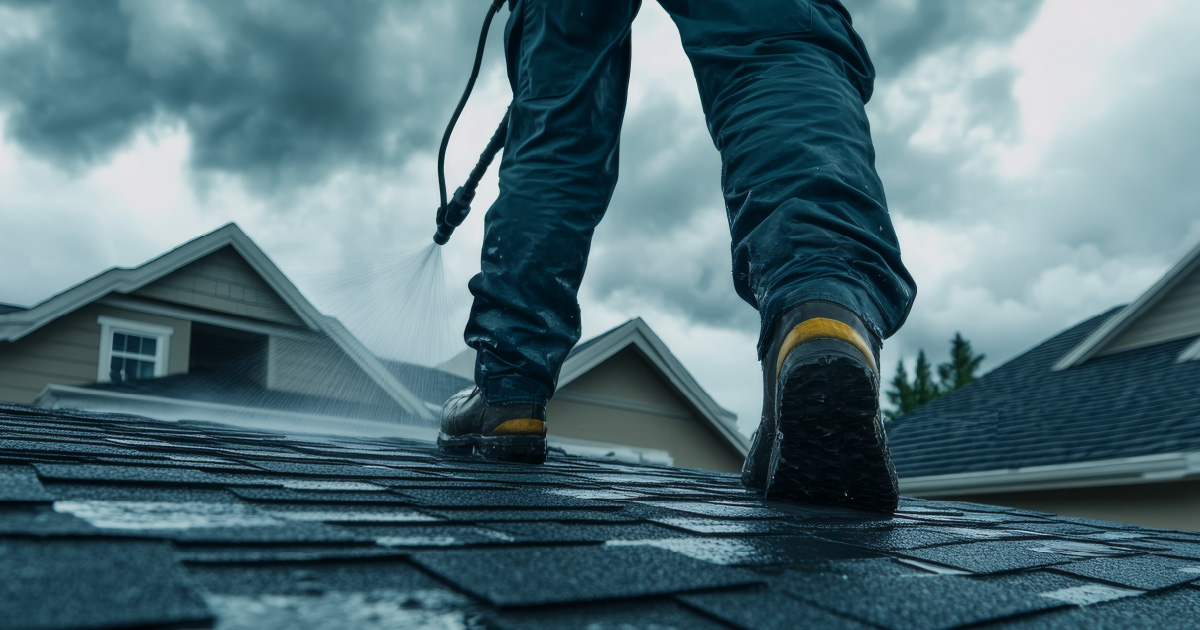Your roof probably doesn’t warrant your attention on a day-to-day basis. Then, one day your mind is finally clear of the daily worries, and you discover that your roof has become covered by unsightly black streaks or debris from nearby trees.
Most people in this situation heave a sigh and add their roof between the driveway and the siding on their running list of things that need to be pressure washed. Don’t be “most people” in this situation. Pressure washing your roof is actually one of the fastest ways to undermine this expensive and vital feature of your home.
What’s The Underlying Cause of a Dirty Roof?
Before you can tackle the problem of a dirty roof, you need to understand the cause. Sometimes the culprit is obvious – like nearby trees that drop leaves, twigs, pine needles, and pollen. This debris is not just unsightly, but it also traps moisture against the shingles and creates a breeding ground for mold and mildew.
Another issue you may encounter is black streaks on your roof, but they are caused by a different source – a specific type of blue-green algae called Gloeocapsa magma. This type of algae is incredibly common in warm, humid climates like the Gulf Coast, and it thrives on the limestone filler in asphalt shingles.
Pressure Washing Shortens a Roof’s Useful Life
Whether your dirty roof stems from trees or algae, you need to know how to restore its former glory. Unfortunately, pressure washing is not the right solution for two important reasons – high water pressure weakens your roof, and this cleaning method can void your warranties.
The “Blast” Factor
The surface of an asphalt shingle is coated with tiny granules that protect the core of the shingles from harmful ultraviolet radiation. A blast from a pressure washer loosens and removes these granules, leaving the asphalt underneath unprotected. Sun and heat then cause the shingles to dry, crack, and become brittle. This process dramatically accelerates the aging of your roof and vastly shortens its useful life.
Voided Warranties
Many manufacturers’ warranties explicitly state that using a pressure washer will void the warranty. They include this clause because they know the damage that high water pressure causes, and don’t want to be responsible for covering repair or replacement for shingles that are improperly maintained.
Like the manufacturer warranty, improper maintenance such as pressure washing will void the workmanship guarantee from the contractor who installed your roof. Without these warranties to protect you, you could be responsible for all repair and replacement costs.
Soft Washing Isn’t a Viable Alternative to Pressure Washing
Some cleaners offer a “safer” alternative to pressure washing called “soft washing.” This method uses chemicals, typically a bleach solution, to clean without high water pressure. Soft washing doesn’t have the “blast” factor of pressure washing, but it still comes with its own set of risks.
The chemicals used in soft washing are powerful and can effectively kill blue-green algae. However, they can also destroy your landscaping, gardens, and flowerbeds. Further, these harsh chemicals over dry vital components of your roof like rubber flashing around vents and pipe boots. Damage to these areas can lead to cracking and leaks – which are costly to repair.
The Right Way to Clean a Dirty Roof
So, if pressure washing and soft washing are bad ideas, what’s the right way to deal with a dirty roof? The answer depends on what’s causing the problem.
If your dirty roof is caused by nearby trees, the best solution is to contact a qualified roofer who has experience working in high places. They can inspect your roof and either clean it or recommend someone who has experience with shingle-safe cleaning methods. Some of the most common methods are brushing the shingles gently with a soft-bristled broom and using a regular garden hose – with normal water pressure – to gently clean tree sap or other stuck-on debris.
To avoid future dirt and debris, contact a professional to trim trees that are overhanding your roof. This will not only keep your roof cleaner but also protect it from falling branches during a storm.
If your dirty roof is caused by algae, it is a good idea to have it inspected by a qualified roofer as soon as possible. Modern shingles include copper granules that are naturally resistant to the algae that causes black streaks. Therefore, black streaks on your roof may be a sign of deterioration or defective shingles.
Complete Roofing Has Answers to Your Roofing Questions
At Complete Roofing, we want you to be free to keep your daily attention on the things that need it most – not your roof. That’s why we focus on educating you on the best roofing products and helping protect your investment with quality workmanship, durable products, and regular inspections.
We only work with CertainTeed shingles – which are available with a StreakFighter® warranty. This means black streaks are a worry for someone else, and you can rest assured that your properly maintained roof is resistant to blue-green algae.
If you have questions about your roof, or want to schedule a complementary inspection, use the contact information below to reach a local expert.
Installation and Repair Services for Roofs and Gutters are available in the following locations:
- Coastal Alabama Main Office with local agents in:
- Coastal Mississippi Main Office with local agents in:
- Greater New Orleans Main Office with a local agent in:
